Cambodia has gone through a lot of history, from the rise and fall of the Khmer empire, to the horrific rule of Pol Pot. While not all of these may be positive, the Cambodians reaped a lot of valuable lessons from these. By visiting the various sites and attractions there, tourists can also learn not only about their culture, but also take to heart what they experienced in the country.
Here are the best things to do in Cambodia to fully immerse yourself in its culture and history!
1. Explore the temples at the Angkor Archeological Park

No trip to Cambodia is complete without visiting the Angkor Archeological Park, which is home to the ruins of over a thousand temples. The sheer size of the area will require at least three days from visitors who want to explore each and every structure there. However, if time will not permit you to visit all of these, make sure to dedicate at least a day to explore the main structures there: Angkor Wat, Bayon Temple, and Ta Prohm.
Angkor Wat is the crowning glory of Cambodia, so much so that it appears on the country’s flag, which is why a visit here should not be missed. The temple provides hints of the Buddhist and Hindu history of the country, as evidenced by the magnificent bas-relief walls depicting various scenes there, which include the levels of heaven and hell, and even scenes from the Hindu epics Ramayana and Mahabharata.
Bayon Temple is best known for the stone faces resembling the Mahayana Buddhist King Jayavarman VII, who ruled Cambodia during the 12th or 13th-century, smiling beneficently to visitors.
Ta Prohm is also known as the “Tomb Raider Temple,” as it was prominently featured in the 2001 “Tomb Raider” film, which starred Angelina Jolie. Unlike the other temples which have been cleared to resemble what they looked like in the glory days of the Khmer empire, Ta Prohm was left as it was originally found, with the large roots of silk-cotton trees and strangler figs intertwined with the crumbling walls of the temple.
Angkor Archeological Park
Address: Krong Siem Reap, Cambodia
Website: Angkor Archeological Park
2. Marvel at the Silver Pagoda in Phnom Penh

Arguably the biggest attraction of Phnom Penh is the Silver Pagoda, otherwise known as the Wat Ubosoth Ratanaram or the Wat Preah Keo, an elegant palace built in 1860. The palace can be found within the Royal Palace complex, along with various stupas, spires, and well-manicured gardens. The Pagoda is home to the Emerald Buddha and a golden Maitreya Buddha, which is decorated with 9,584 diamonds.
Silver Pagoda
Address: Oknha Chhun Street (240), Phnom Penh, Cambodia
3. Visit the floating villages in Tonle Sap

Tonle Sap is the largest freshwater lake in Southeast Asia. It is also the location of the “floating villages,” houses and offices on stilts. Visitors can take a long tail boat to interact with the residents there.
Aside from taking a look at the structures on stilts, avid birdwatchers can also go birding there, as the lake is home to several indigenous species, including the spot-billed pelican, the black-headed ibis, the sarus crane, and the lesser adjutant. The best time to go birding there is from March to June, when there is a higher likelihood of seeing these creatures.
Tonle Sap
Address: Lower Mekong Basin, Siem Reap, Cambodia
You might be interested in these Airbnbs!
4. Watch an Apsara dance performance

The Apsara show is a traditional Khmer performance which combines dance and theater to create what can be considered as a form of art, particularly with the colorful, eye-catching attire of the performers. The performance is anchored on Cambodian mythology, centered on the stories of their gods and kings.
Many of the restaurants have Apsara dance performances at night. However, one of the recommended would be on the Bambu Stage, which also hosts shadow puppet theaters.
Bambu Stage
Address: Krong Siem Reap, Cambodia
Website: Bambu Stage
5. Learn more about Cambodia's violent past by visiting the Landmine and Genocide Museums

Cambodia went into its own Dark Ages between 1975 and 1979, during the Khmer Rouge era, when the dictator Pol Pot ordered the genocide of nearly three million people. Three museums were constructed to provide tribute to the lives lost, as well as to serve as reminders of what happened to the country to help prevent the same events from happening all over again.
The Tuol Sleng Genocide Museum, aka S-21, once served as a high school before it became turned into an interrogation center, where people were tortured and killed. Only a handful survived, and many of them were taken to the Killing Fields in order to be executed.
The Landmine Museum, meanwhile, is found within the Angkor National Park. It provides stories about what happened during the war. Staff members of the museum continue to help nearby villages in clearing areas for mines.
Tuol Sleng Genocide Museum
Address: St 113, Phnom Penh, Cambodia
Landmine Museum
Address: Angkor National Park, Siem Reap, Cambodia
6. Pay respect to the dead at the Chung Ek Killing Fields

The Chung Ek Killing Fields is so called because it served as one of the mass graves of the bodies from Pol Pot’s regime, which led to the deaths of nearly 3 million Cambodians. The Killing Fields is crammed with bones and skulls of some of the victims.
As with the three museums, the Killing Fields may not be the most heartwarming place to visit, but it is still a must for tourists to go to, as remembrance of what happened, and as a cautionary tale.
Killing Fields
Address: 26, Street 302, Phnom Penh 12211, Cambodia
Website: Killing Fields
7. Go diving in Sihanoukville
Posted by Scuba Diving Sihanoukville on Wednesday, 8 June 2016
Sihanoukville is home to diving sites where divers can see a variety of colorful corals and marine life, including whale sharks, sting rays and different species of fish. The beauty of Cambodia is that it has a temperate climate, so visitors can practically go diving all year round. However, the best time for diving would be from November to May.
Non-divers can still enjoy the beaches of Sihanoukville. Aside from diving, Sihanoukville has also built a reputation for being the party place of Cambodia. The country is known for being one of the places in the region to offer cheap beer, with each bottle costing about 0.50 USD.
Sihanoukville
Address: Sihanoukville, Cambodia
8. Have a few drinks along Pub Street

Sihanouksville isn’t the only place in Cambodia where people can enjoy cheap drinks. They can also stroll down Pub Street, aptly named considering that the neighborhood is wall-to-wall with bars, which also offer traditional Khmer food on their menus.
Pub Street
Address: Siem Reap, Cambodia
9. Swim in Koh Rong
Koh Rong Island - Cambodia 😍 🌍 🇰🇭 - Koh Rong, is the second largest island of Cambodia. The word Rong might refer to an old term for cave or tunnel. 🤓
Posted by Beautiful Beaches of The World on Sunday, 14 May 2017
Koh Rong is an island in the Gulf of Thailand, known for its white sand shores and turquoise waters. Forests can also be found within the isle, which serve as homes for various wildlife. Trekking, snorkeling, and diving can be arranged while there. However, given the fact that the island has not yet been developed, it might be a better option not to spend the night there.
Koh Rong
Address: Koh Rong, Krong Preah Sihanouk, Cambodia
10. Eat something exotic

If you have a cast-iron stomach – and resolve – you may want to get a bite of the exotic food Cambodia has to offer, which includes deep-fried tarantulas, silkworm grubs, crickets, and frogs. Apparently, Cambodians used these as food during the Khmer Rouge regime, when the residents experienced a country-wide food shortage. Since then, however, these have been turned into a local delicacy, offered as street food or even in fancy restaurants. Exotic food is offered by food stalls along the street. You can also go to the Old Market in Siem Reap to feast on these creepy-crawly critters.
Old Market
Address: Krong Siem Reap, Cambodia
Cambodia: A country rich in experiences
Cambodia is best known for its temples, but it offers so much more than that. While it may not be the richest country in the region, it more than makes up for it in culture and history, and it is generous enough to share its past with other people.
Tip from Content Creator



Cambodia is a beautiful country with resilient people. The people of this country really make it what it is. Some highlights from our trip are Siem Reap, Phnom Penh, Battambang, and Kampot, and our experiences in each place were different. We seemed to walk for ages and do so much in Battambang, but in Kampot, we focused on relaxing. It was nice taking each place at a different pace and enjoying going really crazy at one location and then taking it all in at a slower pace in another.
I also cannot go talking about Battambang without mentioning the incomparable tour guide we had. Samol was such a great tour guide, giving us lots of history and also sharing lots of laughs with us. He really made our time in Battambang special and made sure we got to do everything we wanted in the short time we were there.
History
Get Trip101 in your inbox
Unsubscribe in one click. See our Privacy Policy for more information on how we use your data






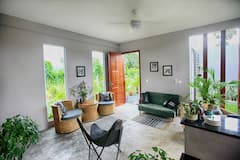
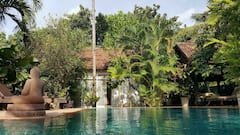
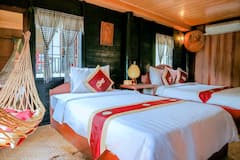
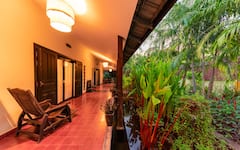
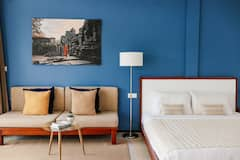














Create an account to